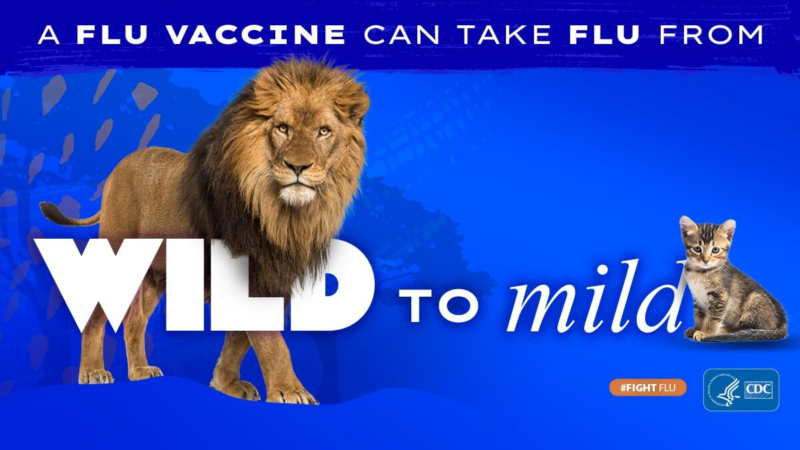Trump administration yanks CDC flu vaccine campaign
The Centers for Disease Control and Prevention is stopping a successful flu vaccination campaign that juxtaposed images of wild animals, such as a lion, with cute counterparts, like a kitten, as an analogy for how immunization can help tame the flu.
The news was shared with staff during a meeting on Wednesday, according to two CDC staffers who spoke with NPR on the condition of anonymity because they were not authorized to speak publicly, and a recording reviewed by NPR.
During the meeting, leadership at the National Center for Immunization and Respiratory Diseases told CDC staff the Department of Health and Human Services had reviewed the campaign and advised that it would not continue.
The move comes during Robert F. Kennedy Jr.’s first full week on the job as head of HHS.
The “Wild to Mild” flu vaccination campaign sought to encourage people to get the flu vaccine. In particular, the campaign aimed to communicate that flu vaccination can lessen symptoms and the chance of getting severely ill, even if it doesn’t prevent someone from catching the flu.
The Trump administration’s decision to pull the campaign comes in the midst of a brutal flu season that’s still raging. More than 50,000 patients were admitted to hospitals for influenza during the week ending Feb. 8, the highest level in 15 years.
Paid media for the ad campaign was ending on Wednesday, according to the current CDC staff member who spoke to NPR. The website for the “Wild to Mild” vaccination campaign is already offline.
Requests for comment to the CDC and HHS were not immediately returned.
The campaign sought to “reset public expectations around what a flu vaccine can do in the event that it does not entirely prevent illness,” according to the CDC’s webpage describing the launch of the campaign in 2023. It was renewed for the current flu season.
“We found that it was very successful—people understood the message, [and] they were swayed by the message,” Erin Burns, associate director for communications in the CDC’s influenza division, told the trade website Fierce Pharma in October 2024.
The campaign was a response to falling flu vaccination rates since the start of the COVID-19 pandemic and targeted groups at higher risk, the CDC’s launch webpages said, “especially pregnant women and children.”
“The CDC campaign is a creative and effective way of conveying an extremely important public health message about ‘partial protection’ vs. ‘complete prevention’ of disease,” Marla Dalton, executive director of the National Foundation for Infectious Diseases, told NPR in an email.
While it was primarily digital, the campaign also found a home in public transit over the fall. “Wild to Mild” branding was wrapped around trains in four major cities and ads were featured at mass transit stations. According to a presentation from CDC in November, those ads reached more than 30 million riders and generated another 30 million digital impressions by the end of October last year.
It’s unclear how much time was left in the campaign, but it would have at least gone through the end of this flu season and the materials would have stayed on the agency’s website, one of the CDC staffers told NPR.
Have information you want to share about the ongoing changes at federal health agencies? Reach out via encrypted communications: Will Stone @wstonereports.95
States sue Trump administration for blocking the development of wind energy
Attorneys general from 17 states and D.C. are challenging an executive order Trump signed on his first day in office pausing approvals, permits and loans for all wind energy projects.
It’s last call for Skype as the once-popular video calling app shuts down
Microsoft has announced that the pioneering online video calling service that's been around for more than two decades will go offline on Monday.
The best 6 TV performances I’ve seen so far this year
NPR TV critic Eric Deggans picks his favorite performances of 2025 thus far, including Noah Wyle in The Pitt, Catherine O'Hara in The Last of Us and The Studio, and Carrie Coon in The White Lotus.
Supermarket displays of oranges will never look the same after reading ‘Foreign Fruit’
In her new hybrid memoir, Katie Goh unravels the multitudes citrus fruit contains, in lockstep with mythologies of colonialism, inheritance and identity.
A Maryland town backed Trump’s cost-cutting pledge. Now it’s a target
Emmitsburg is home to the National Fire Academy, effectively the war college for U.S. firefighters. The Trump administration's decision to halt classes has some townspeople pondering their votes.
Trump says he will reopen Alcatraz for the ‘most ruthless and violent’ prisoners
The prison on a forbidding island off San Francisco was operated at a prohibitive cost. Now, President Trump says it's time to substantially enlarge and rebuild Alcatraz as a federal penitentiary.









